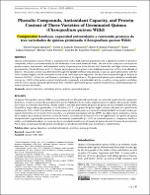Phenolic compounds, antioxidant capacity, and protein content of three varieties of germinated quinoa (chenopodium quinoa willd)
Fecha
2021Autor(es)
Choque Quispe, David
Ligarda Samanez, Carlos A.
Ramos Pacheco, Betsy S.
Leguía Damiano, Saida
Calla Florez, Miriam
Zamalloa Puma, Lourdes Magaly
Colque Condeña, Luisa
Metadatos
Mostrar el registro completo del ítemResumen
Quinoa (Chenopodium quinoa Willd) is a pseudocereal with a high nutritional potential and a significant content of bioactive
compounds, which is consumed mainly by the inhabitants of the South American Andes. The aim of this study was to evaluate the
protein content, total phenols, and antioxidant activity of quinoa grains of the Salcedo INIA, Pasankalla, and Negra collana varieties,
germinated for 24 and 48 hours at 35 ◦C. Organic quinoa grains were grown in the Andahuaylas province in Peru, at an altitude of
3582 m. The protein content was determined through the Kjeldahl method, total phenols, in turn, by spectrophotometry with the
Folin-Ciocalteu reagent, and the antioxidant activity of the DPPH type were registered. The data were analyzed through an Analysis of
Variance (ANOVA), a Tukey test, and Pearson’s correlation at 5% significance. The germinated quinoa grains showed a considerable
increase (p < 0,05) in their protein content, total phenolic compounds, and antioxidant activity, as well as a strong positive correlation
with the size of sprouts during the germination time. Therefore, germinated quinoa could be considered as a promising product for
human nutrition and health.
Colecciones
El ítem tiene asociados los siguientes ficheros de licencia:

